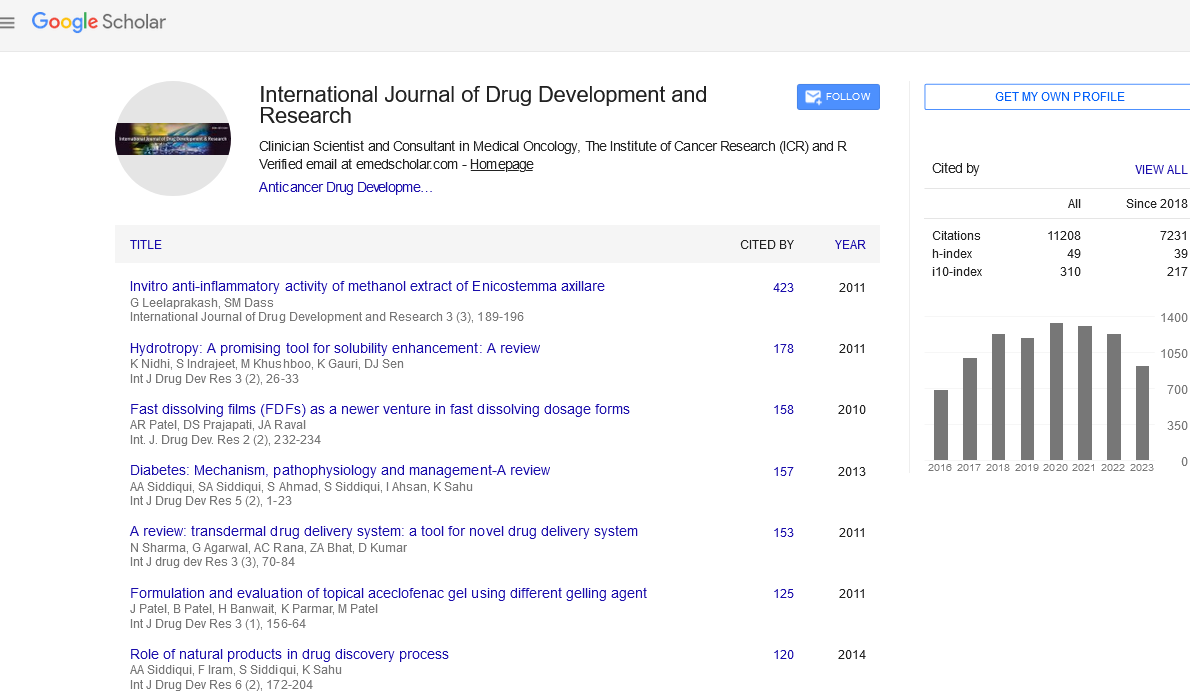Perspective - (2024) Volume 16, Issue 3
Healthcare Insights: Perspectives on Virtual Clinical Trials and Compliance
Alson Bakwr*
Department of Biotechnology, University of Tirana, Tirana, Albania, Albania
*Correspondence:
Alson Bakwr, Department of Biotechnology, University of Tirana, Tirana, Albania,
Albania,
Email:
Received: 08-May-2024, Manuscript No. IJDDR-24-14790;
Editor assigned: 10-May-2024, Pre QC No. IJDDR-24-14790 (PQ);
Reviewed: 24-Jun-2024, QC No. IJDDR-24-14790;
Revised: 31-May-2024, Manuscript No. IJDDR-24-14790 (R);
Published:
10-Jun-2024
Introduction
In the dynamic landscape of healthcare, the traditional model
of clinical trials is undergoing a remarkable transformation with
the advent of Virtual Clinical Trials (VCTs). These innovative trials
leverage digital technologies to conduct research remotely,
promising to enhance efficiency, accessibility, and patient-centricity in drug development. This article explores the
evolution of clinical trials, the key components of VCTs, their
benefits, challenges, and the future implications of this
paradigm shift in medical research.
Description
Evolution of clinical trials
Clinical trials are the cornerstone of evidence-based medicine,
providing essential data for evaluating the safety and efficacy of
new treatments. Historically, these trials have been conducted in
a controlled, clinical setting, requiring frequent in-person visits
for patient monitoring, data collection, and adherence to
protocols. While this traditional approach has yielded valuable
insights, it is often associated with logistical challenges, high
costs, and limited patient participation.
The emergence of digital health technologies has paved the
way for a new era in clinical research. Virtual clinical trials, also
known as decentralized trials or remote trials, represent a
departure from the traditional model by harnessing the power
of telemedicine, wearable devices, mobile apps, and remote
monitoring tools. This paradigm shift holds the promise of
transforming the way clinical research is conducted, making
trials more accessible, inclusive, and patient-centric.
Key components of virtual clinical trials
Virtual clinical trials leverage a range of digital tools and
platforms to streamline the research process and enhance
patient engagement. Some key components include:
Remote patient recruitment and consent: Digital platforms
enable researchers to reach a broader pool of participants,
including those in remote locations or with limited mobility.
Patients can consent to participate in trials remotely, reducing
the need for in-person visits and paperwork.
Telemedicine and remote monitoring: Telemedicine allows
for virtual consultations between patients and healthcare
providers, eliminating the need for physical appointments.
Remote monitoring devices, such as wearables and sensors,
enable real-time data collection on patient health metrics,
medication adherence, and symptom tracking.
Mobile health (mhealth) apps: Mobile apps facilitate
communication between researchers and participants, providing
educational resources, reminders for medication intake, and
tools for self-reporting symptoms. These apps enhance patient
engagement and compliance with study protocols.
Electronic Data Capture (EDC) systems: EDC systems digitize
the process of collecting, managing, and analyzing clinical trial
data. Researchers can securely access and analyze data in real-time, speeding up the decision-making process and reducing the
risk of errors associated with manual data entry.
Benefits of virtual clinical trials
The adoption of virtual clinical trials offers several potential
benefits for patients, researchers, and sponsors:
Improved patient access: Virtual trials remove geographical
barriers and increase access to clinical research for patients who
may have difficulty participating in traditional trials due to
distance, transportation issues, or health conditions.
Enhanced patient engagement: Digital tools enable ongoing
communication and support between patients and researchers,
fostering greater engagement and adherence to study protocols.
Patients feel more connected to the research process and
empowered to take an active role in their healthcare.
Cost efficiency: By reducing the need for physical
infrastructure, travel expenses, and site visits, virtual trials can
lower the overall cost of conducting clinical research. Sponsors
can allocate resources more efficiently, potentially accelerating
the pace of drug development.
Faster recruitment and data collection: Virtual trials have the
potential to shorten recruitment timelines by reaching a larger
and more diverse pool of participants. Real-time data collection
and analysis enable researchers to make timely decisions and
adapt study protocols as needed.
Challenges and considerations
Despite their potential, virtual clinical trials also present
unique challenges and considerations:
Digital divide: While digital technologies have the potential to
enhance inclusivity, disparities in access to technology and
digital literacy may exacerbate existing inequalities in
healthcare. Efforts are needed to ensure equitable access to
virtual trials for all populations.
Data privacy and security: The collection and storage of
sensitive health data raise concerns about patient privacy and
data security. Robust data encryption, compliance with
regulatory requirements such as HIPAA, and transparent
communication with participants are essential to maintain trust
and confidentiality.
Regulatory considerations: The regulatory landscape for
virtual trials is still evolving, with guidelines and requirements
varying across jurisdictions. Regulatory bodies need to adapt to
the changing landscape and provide clear guidance on the
conduct of virtual trials while ensuring patient safety and data
integrity.
Patient retention and compliance: Maintaining patient
engagement and adherence to study protocols can be
challenging in virtual trials, where participants may feel less
connected to the research process. Strategies such as
personalized communication, incentives, and user-friendly
digital interfaces can help improve retention rates.
Future implications
Virtual clinical trials represent a paradigm shift in medical
research, offering the potential to revolutionize the way clinical
trials are conducted and accelerate the pace of innovation in
healthcare. By leveraging digital technologies, these trials hold
the promise of enhancing patient access, engagement, and
inclusivity while improving efficiency and reducing costs for
researchers and sponsors.
Conclusion
However, realizing the full potential of virtual trials requires
addressing key challenges related to technology access, data
privacy, regulatory compliance, and patient retention.
Collaborative efforts from stakeholders across the healthcare
ecosystem are essential to overcome these barriers and harness
the transformative power of virtual clinical trials.
As we look to the future, virtual clinical trials have the
potential to drive greater innovation, collaboration, and patient-
centered care in drug development and healthcare delivery. By
embracing digital transformation, we can unlock new
opportunities to improve health outcomes and advance the
science of medicine for generations to come.
Citation: Bakwr A (2024) Healthcare Insights: Perspectives on Virtual Clinical Trials and Compliance. Int J Drug Dev Res Vol:16 No:3






